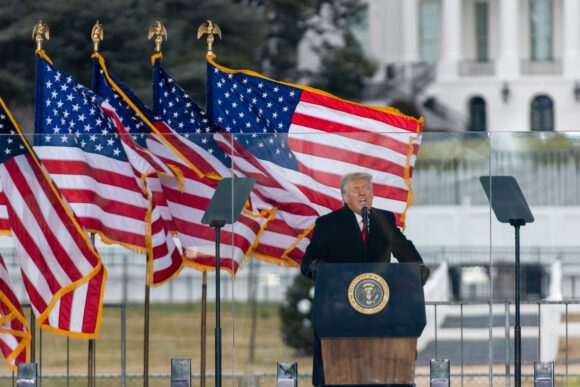Donald Trump is not entitled to absolute presidential immunity against criminal charges over his efforts to overturn the 2020 presidential election, a federal judge ruled, saying the office doesn’t come with a “lifelong ‘get-out-of-jail-free’ pass.”
US District Judge Tanya Chutkan on Friday rejected Trump’s early efforts to get the federal indictment against him in Washington tossed out, including his contention that he could not be prosecuted over actions he took after the 2020 election while he was president.
Trump’s “four-year service as Commander in Chief did not bestow on him the divine right of kings to evade the criminal accountability that governs his fellow citizens,” the judge wrote.
Chutkan also denied Trump’s separate motions to dismiss the case on the grounds that the charges are unconstitutional.
The judge’s decision is expected to be swiftly appealed by Trump’s legal team. His attorneys already have signaled that they would challenge a loss on the immunity issue, and believe that all of the criminal case proceedings should be paused until that issue is fully litigated, potentially up to the US Supreme Court.
Trump spokesperson Steven Cheung said in a statement that the former president would challenge Chutkan’s decision. He accused “radical Democrats” of trying to “destroy bedrock constitutional principles and set dangerous precedents that would cripple future presidential administrations and our country as a whole, in their desperate effort to interfere in the 2024 Presidential Election.”
A spokesperson for Special Counsel John “Jack” Smith’s office declined to comment.
A trial in the federal election obstruction case against Trump is set to begin March 4. Trump’s lawyers have pushed for longer timelines in the case and unsuccessfully argued to delay a trial until after the 2024 general election in November.
Chutkan’s decision came hours after the US Court of Appeals for the DC Circuit rejected Trump’s effort to claim presidential immunity against civil claims seeking to hold him responsible for the violence at the US Capitol on Jan. 6, 2021.
No Civil Immunity
The appeals court judges found that he wasn’t entitled to the immunity at this stage because the civil lawsuits brought by Democrats in Congress and law enforcement officers alleged his conduct was part of his political campaign, and not his presidential duties. The US Supreme Court has held in the past that presidents can’t be sued over official acts.
The DC Circuit panel said it wasn’t ruling on the question of presidential immunity against criminal prosecution, only certain civil claims. But the decision offers a road map for Smith’s office to defend Chutkan’s decision once Trump appeals it to the same court.
The court said he could potentially revive the civil immunity fight later if he presented evidence that he was, in fact, carrying out official presidential duties.
Chutkan wrote that while she was rejecting Trump’s claim of absolute immunity against prosecution, she wasn’t ruling yet on arguments he might make that the alleged criminal acts were part of his official duties and could be entitled to immunity.
In the 48-page opinion, Chutkan held that the “text, structure, and history” of the US Constitution doesn’t permanently shield former presidents against “investigation, indictment, prosecution, conviction, and punishment for any criminal acts undertaken while in office.” The Constitution’s 18th century drafters wanted the US chief executive to be “wholly different from the unaccountable, almost omnipotent rulers of other nations at that time,” she wrote.
No Free Pass
“Whatever immunities a sitting President may enjoy, the United States has only one Chief Executive at a time, and that position does not confer a lifelong ‘get-out-of-jail-free’ pass,” she wrote.
The judge rebuffed other arguments Trump’s lawyers raised, including that a president could only be criminally prosecuted if they were first convicted in a US Senate impeachment trial or that the threat of future prosecution could interfere with a sitting president’s ability to carry out their duties.
“If the specter of subsequent prosecution encourages a sitting President to reconsider before deciding to act with criminal intent, that is a benefit, not a defect,” Chutkan wrote.
Chutkan has yet to rule on Trump’s motions to dismiss the indictment on claims that he’s a victim of “selective and vindictive prosecution” by the Justice Department under his political rival President Joe Biden and that the charges are otherwise invalid.
In Friday’s opinion, she rejected Trump’s contention that the indictment violated the First Amendment since prosecutors alleged his speech and political activities were used “as an instrument of a crime.” Trump’s acquittal in his 2021 Senate impeachment trial also didn’t create a double jeopardy problem, she wrote.
And the judge concluded that the indictment didn’t violate Trump’s due process rights because he would have been on “fair notice” that his conduct leading up to the Jan. 6 attack might be illegal.
“There is also a long history of prosecutions for interfering with the outcome of elections,” she wrote.
Topics USA
Was this article valuable?
Here are more articles you may enjoy.



 Florida Engineers: Winds Under 110 mph Simply Do Not Damage Concrete Tiles
Florida Engineers: Winds Under 110 mph Simply Do Not Damage Concrete Tiles  Insurify Starts App With ChatGPT to Allow Consumers to Shop for Insurance
Insurify Starts App With ChatGPT to Allow Consumers to Shop for Insurance  What Analysts Are Saying About the 2026 P/C Insurance Market
What Analysts Are Saying About the 2026 P/C Insurance Market  Experian Launches Insurance Marketplace App on ChatGPT
Experian Launches Insurance Marketplace App on ChatGPT 

